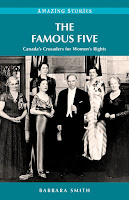“Drawing
from a trove of new documents and sources as well as extensive genealogical
research, Larson reveals Tubman as a complex woman -- brilliant, shrewd, deeply
religious, and passionate in her pursuit of freedom.”
-WorldCat
“Who
was Harriet Tubman? For those slaves whom she led north to
freedom, she was Moses. To the slavers who hunted her down, she was a thief and
a trickster. As Catherine Clinton shows in
this biography, she was, above all, a singular and complex
woman, defeating simple categories.” -WorldCat
“Canada's
relationship with its Indigenous people has suffered as a result of both the
residential school system and the lack of understanding. Guided by Indigenous author Monique Gray Smith, readers will learn about the lives of
Survivors and listen to allies who are putting the findings of the Truth and
Reconciliation Commission into action. -Amazon
“On
August 27, 1927, five women gathered to sign a letter that would change the
course of Canadian history. Emily Murphy, Nellie McClung, Louise McKinney,
Irene Parlby, and Henrietta Muir Edwards launched a battle for justice that finally culminated in a declaration
that women were indeed "persons" in the eyes of the law.”
–WorldCat
"The
Inconvenient Indian is a critical and personal meditation that the remarkable
Thomas King has conducted over the past 50 years about what it means to be
‘Indian’ in North America.” -WorldCat
“Discover
the amazing story of the Indigenous peoples of the Americas from the end of the
Ice Age to the arrival of the Europeans. You'll learn what people ate, how they
expressed themselves through art, and how they adapted to the land.
Archaeologists have been able to piece together what life may have been like
pre-contact-- and how life changed with the arrival of the Europeans.”
-WorldCat





